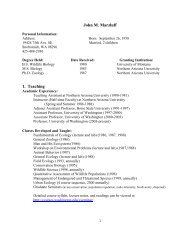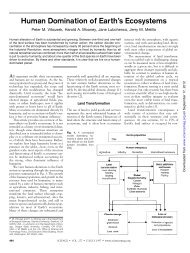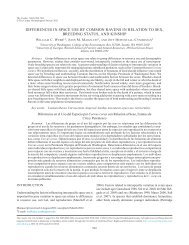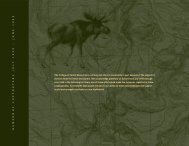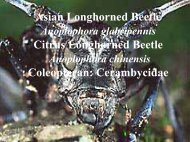Create successful ePaper yourself
Turn your PDF publications into a flip-book with our unique Google optimized e-Paper software.
Ch14 10/5/99 2:19 PM Page 354<br />
354 CHAPTER 14<br />
Figure 14.12<br />
Fleshy fruiting body of<br />
Laetiporus sulphureus.<br />
although some fungi can spread as much as 60 cm/year. It takes a long time for<br />
decay to become well established in conifers, and thus decay is uncommon in<br />
young trees. It is much more common in old-growth trees where it is has had a<br />
long time to develop.<br />
Decay is generally much faster in hardwoods than conifers. Hardwoods are<br />
more susceptible to wounding and branch breakage and generally have fewer<br />
extractive chemicals in the heartwood to protect against decay. Some hardwoods,<br />
however, particularly tropical species and some species of eucalypts in Australia,<br />
such as jarrah (Eucalyptus marginata) are very decay resistant. Species that stump<br />
sprout are susceptible to further infection since the sprouts can be infected via<br />
decayed heartwood in the stump.<br />
The Concept of Compartmentalization of Decay in Trees (CODIT)<br />
This concept was developed by Dr. Alex Shigo (USDA Forest Service, NE Forest<br />
Experiment Station), who dissected thousands of eastern deciduous hardwood trees<br />
and conifers and examined the patterns of decay (Shigo and Marx 1977, Shigo<br />
1984). Unlike animals, trees do not have the ability to regenerate damaged tissues.<br />
They can, however, confine damage due to stem decay fungi to certain areas and<br />
impede the rate of decay development. CODIT is illustrated in Figure 14.13.<br />
Wounded trees possess four walls that compartmentalize decay fungi. Wall 4, or<br />
the barrier wall, is formed at the cambium at the time of wounding and is the



